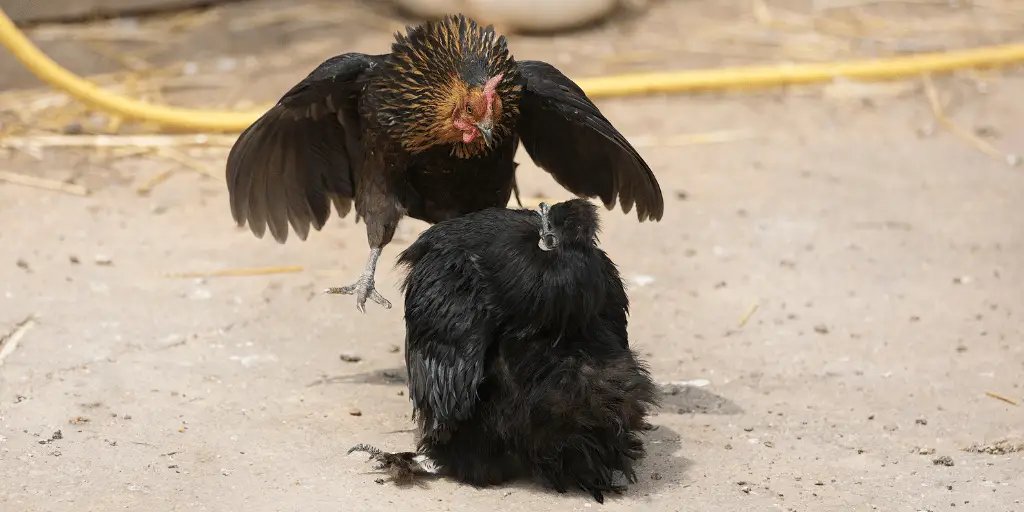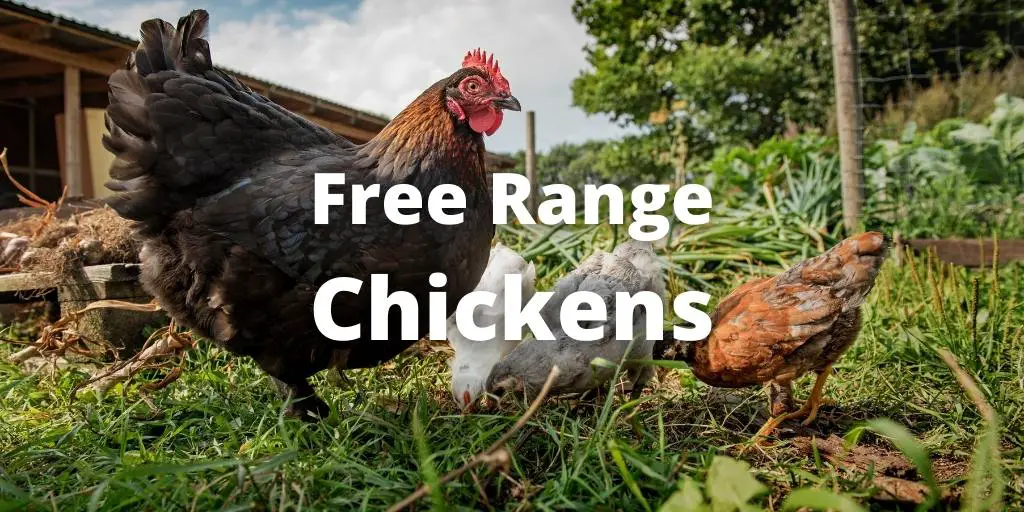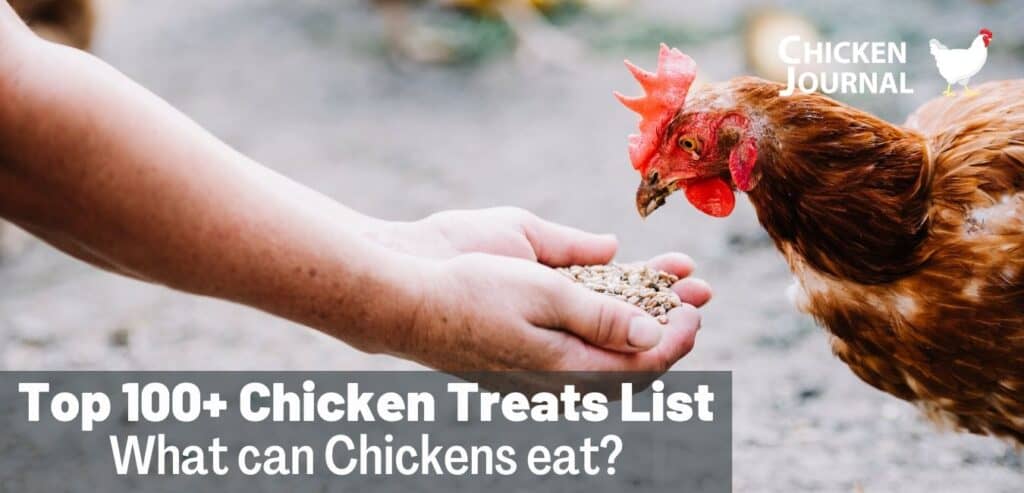Are you worrying about a chicken bullying sick ones in your flock? I’ve repeatedly seen this worrying chicken behavior as a professional chicken farmer.
Chickens bullying sick chickens is a thing to worry about because if it’s not treated, it may lead to the death of the weak chicken.
It is a complicated issue in chicken flocks, influenced by pecking order, stress, and sickness.
Chicken bullying is similar to human bullying. It occurs when one or more chickens repeatedly peck on or bully another chicken, often causing severe injury or death.
Poultry raisers like me must understand this behavior, its origins, and possible treatments to protect the flock.
Understanding Chicken Behavior
Chickens live in flocks organized by a sophisticated social hierarchy called the “pecking order.” This hierarchy describes their social system, determining each chicken’s status in the flock.
It determines their eating order and nighttime roosting place. The name “pecking order” is linked to how chickens develop and maintain this social position, where a peck can mean much more.
Bullying doesn’t always include bird pecking. Instead, chickens naturally establish hierarchy and maintain flock harmony. When pecking becomes aggressive and persistent bullying, weaker or sicker birds are targeted.
Many animals are habitual, including chickens. They rely on routines; therefore, any interruption can cause stress-related behavior. Stress in chickens can cause aggression and bullying.
Sick hens behave differently because of weakness. Their new habits interrupt the routine, leaving them more vulnerable to bullying than other healthy chickens.
Understanding these chicken behavior traits helps explain bullying, mainly when it includes sick chickens.
Also read: List of all chicken behaviors
Reasons Chickens Bully a Sick Chicken
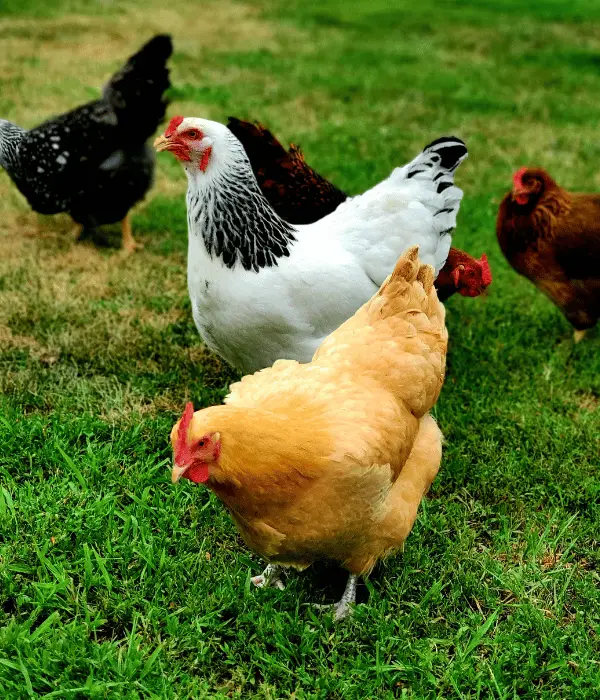
So, Why Chickens Bully Sick Chickens?
Here are a few common reasons behind this problem:
Disease Detection: Chickens naturally sense illness in their flock. One sick chicken generally behaves, looks, and moves differently from the others. Chickens may be bullied because of these changes.
Chickens are highly observant and can identify feeling sick chickens by smell, physical expressions, or vocalization. The pecking and harassment are because they address this suspected danger to the flock.
Remove seen weakness: Chickens follow “survival of the fittest.” Any weakness or weakness can harm the flock. Chickens instinctively remove dangers to the group’s well-being.
Sick chickens may appear weaker and less able to protect themselves or compete for resources, making them easy targets. Chickens attack weaker ones to maintain flock strength and vitality.
Small space according to flock size: More space in chicken coops or runs can stress flock members. Stress from confined living may increase dislike and bullying. A healthy chicken can be bullied, but a sick chicken is especially vulnerable.
Being an easy target encourages bullying. Chickens need space to move and create their territories to prevent stress and bullying, especially when unwell.
Chicken competes for resources: Chickens compete aggressively for food, water, and shelter. A sick chicken may need more energy or the ability to compete for these resources.
This might be considered a weakness in a competitive flock, and other hens may deny the sick bird access to essential nutrients. Bullying can involve pecking and solitary existence.
Environmental Changes: Coop or run changes might cause bullying when a chicken is unwell. Adding hens or changing the layout might stress the flock and disturb its order. Their flock mates may target sick hens or roosters due to their sensitivity to these changes.
Territorial Disputes: Sick chickens might disturb the coop or run established territories. New or unfamiliar chickens may cause territorial issues involving the sick chicken. As chickens compete for territory and dominance, bullying can occur.
Lack of friendliness: Chickens are friendly pets, making introducing new or sick birds into a flock challenging. Chickens may bully to establish their social hierarchy and maintain flock order. This is especially difficult for sick chicks to fit in a new flock.
Signs of Chicken Bullying in the Coop
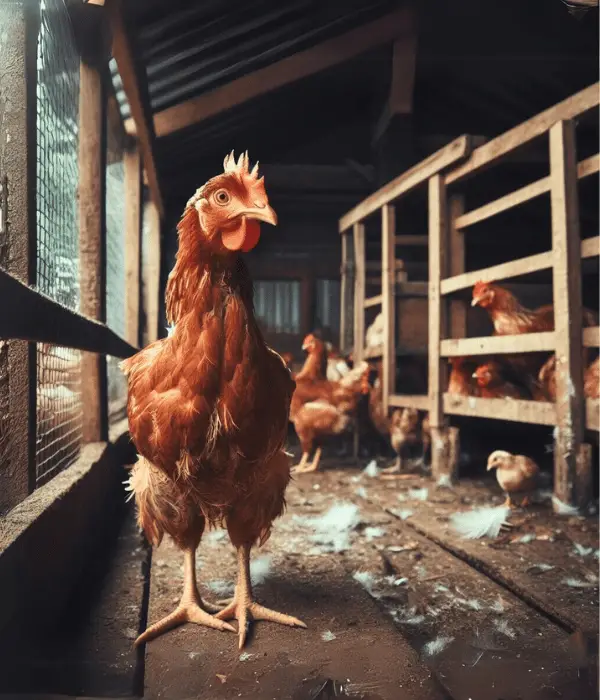
Here are a few common signs and symptoms of chicken bullying chickens:
Injuries on the chicken body: Chicken bullying is most apparent when the tortured bird has visible injuries. The injuries usually appear as peck marks, scratches, or deep open wounds.
Here are a few of the best wound care sprays for chickens.
Chickens bully by hitting their victims’ feathers, combs, wattles, or skin. Untreated injuries can cause blood loss, pain, infections, and ultimately death.
Feather loss in chickens: Chicken bullying often causes feather loss. Bullied hens typically have their feathers plucked.
This makes regions of naked skin susceptible to freezing temperatures. Bullying can be seen in feather loss, so keep the feather-losing flocks separate from healthy ones.
Self-isolated bird: The bullied chickens generally withdraw themselves from the flock. Their main activity is hiding or avoiding other chickens.
The bullied chicken may get more stressed and anxious due to isolation. A chicken that constantly separates from the flock is a sign of bullying.
Loss of appetite: Stress from bullying might impact a chicken’s appetite. Bullied chickens may lose their appetite and eat less. This might cause weight loss, nutritional deficits, and weakening in the chicken.
Reduced egg production: Bullying can also reduce chicken egg production. Stressed and poorly treated hens may produce fewer eggs. This decline in egg laying indicates stress and affects poultry owners commercially.
Stressed chicken: In addition to losing feathers, stressed chickens may pluck their feathers excessively. This habit often helps them cope with stress and discomfort. It can cause self-harm and worsen bullying.
Pacing and Angry Behavior: Bullied chickens may pace, move, and be restless. Bullying may make them uncomfortable and unhappy, which might harm their health.
Impact of Bullying: From Chicken Bullying Hen to Chickens Bullying New Chicken
The significant impact of chickens bullying sick chickens is detailed below:
Injuries in bodies: Physical injuries are the most apparent consequence of chicken bullying. Pecking, scratching, and aggressiveness can cause bruising, wounds, and blisters on the skin.
These injuries can cause infections, blood loss, and long-term health issues if left unsupervised. Bullied chickens may suffer long-term pain and suffering.
Reduced egg production: Bullied chickens are stressed, which reduces their egg production. Stress-induced hormonal changes may significantly reduce egg production.
Small backyard chicken keepers and large poultry farms may suffer from this, impacting profitability.
Stress: Chickens bullied experience high stress. Stress harms a chicken’s immune system, digestion, and overall health. It is because the bullied chicken is more sensitive to diseases and less adaptable to environmental changes.
Growth retardation: Bullying can lower flock productivity. Stressed and injured chickens are less likely to eat feed, and growth retardation is seen in the individual bird.
When a chicken does not gain weight in early life, their growth permanently stops at a particular size.
Potential mortality: Extreme bullying can kill the chicken. Physical trauma, stress, and weakened immunological function may kill the chicken. This has ethical and practical ramifications for animal welfare and flock management.
The Extreme Case: Chicken Bullied to Death
Bullying a chicken to death is one of the saddest things that may happen in poultry farming. This painful outcome usually occurs when continuous and cruel bullying targets a weak or sick chicken.
This severe example highlights the serious effects of unmanaged flock hostility and the importance of caregivers in keeping their feathered friends safe and happy.
Imagine a coop full of chickens clucking and interacting. However, a weak chicken may stand out. This weak chicken becomes the object of harsh and constant bullying, being pecked, harassed, and deeply injured.
Regular pecking can cause cuts, scrapes, and bleeding hole-like wounds. To prove their power or eradicate seen weakness, chickens are prone to harming their fellow flock members.
If not treated immediately, these physical injuries can cause infections, blood loss, and long-term suffering for the bullied chicken.
The continuous aggression injures the chicken and creates suffering and stress. Under extreme stress, the bullied chicken may stop eating and drinking.
Refusing necessary nutrition can cause starvation and dehydration, causing the chicken’s long and painful death.
Witnessing such a horrible result is painful for those who care for our feathered friends. It highlights the importance of knowing about and controlling poultry bullying to prevent aggression and protect flock members.
Chicken raisers must be aware of flock interactions to spot bullying before it increases. This requires monitoring individual hens for isolation, visible injuries, and changes in eating and drinking patterns.
Creating a stress-free, spacious, and socially balanced setting can greatly prevent bullying.
Expert Strategies to Prevent Chickens Bullying Sick Chickens
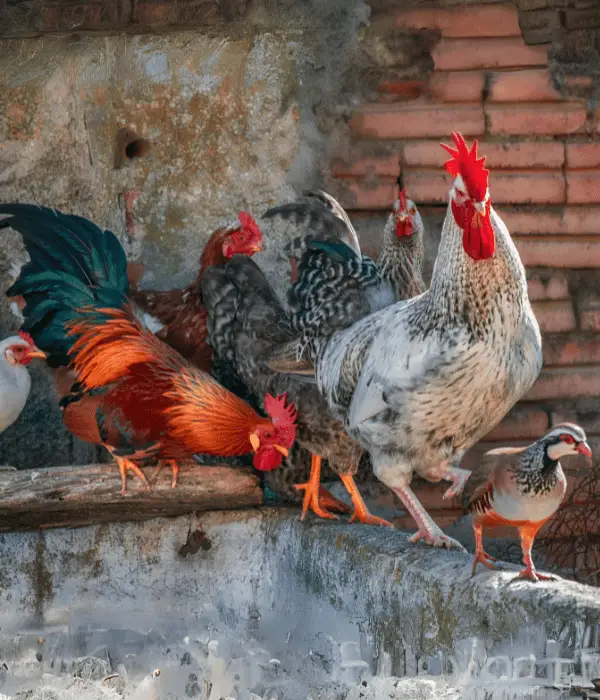
Below are a few fantastic and easy strategies to prevent chickens from bullying sick chickens:
1. The flock needs enough space:
Space in the chicken coop is essential. Overcrowded hens are more violent due to stress. Ensuring each chicken has enough space to move around, roost, and create territories reduces bullying.
2. Slowly Adding New Chickens:
The strategy of introducing new chicks gradually to the existing flock is appropriate. Gradual introduction reduces bullying by allowing established chickens to adjust to newcomers. It gives social dynamics time to adjust without stressing other chickens.
3. Multiple food and water stations:
Chickens are territorial about food and water. Multiple feeders and waterers in the coop reduce resource challenges. Providing enough feed and water decreases bullying.
4. Diverse Environmental Enrichment:
An exciting atmosphere helps reduce stress and boredom, which can lead to bullying. Provide perches, nesting boxes, and other chicken-friendly items. This promotes their natural actions and deters aggression.
5. Nutritional Balance:
Food must be balanced and nourishing for the whole flock. Well-fed flocks are healthier and less reactive to stress, including bullying. Check that chicken feed fits their nutritional demands at different life stages to promote health.
6. Regular Health Checks:
Check the flock often for indications of disease. Healthier chickens can bully sick chickens due to their weakness. Addressing health issues quickly improves flock health and harmony.
7. Monitoring and Intervention:
Watch flock interactions regularly. If bullying is suspected, act quickly. To help the bullied chicken recover, isolate it and treat the root causes.
8. Understanding Flock Dynamics:
Learn the chicken flock’s essential behaviors. Understanding social hierarchy helps you foresee and prevent disputes. Understanding chicken behavior helps you distinguish between joyful pecking and dangerous bullying.
9. Safe Retreats:
Give bullying birds a place to hide in the coop. Hideouts or high perches help bullied chickens escape. If she was still attacked, then consider moving to a different coop till recovery.
10. Continuous monitoring and adaptation:
Monitoring flock behavior is essential for prevention. Be flexible and tweak strategies as the flock changes. Proactive and responsive management ensures the chicken community’s well-being and peace.
These expert strategies reduce sick chicken bullying by creating a friendly environment. It addresses chicken care’s physical and psychological aspects to create a peaceful and stress-free flock.
Expert Tips for Handling a Chicken Bullying Other Chicken
Here are a few common things to do with a chicken bullying other chickens:
1. Isolate Bully Chicken: Focus on isolating the chicken, bullying the weak birds. Separating the bulling chicken into a different coop helps the bullied chicken.
It helps to reduce the aggressive behavior of the bullying chicken. At the same time, the weak chicken gets some time to recover from the previous injuries.
2. Offer Coop Distractions: Chicken toys, food treats, and heightened roosting bars can be helpful.
These things and activities ultimately reduce the boredom and stress of the bullying chicken. Moving the chicken’s focus on things to enjoy decreases her aggression.
3. Maintain a Healthy Environment: A clean, spacious, and well-ventilated coop is necessary. Sufficient feed, water, and roosting perches reduce stress.
Keeping the flock healthy and happy decreases chicken bullying. So, try to increase the quantity of chicken waterers and feeders to avoid fighting and mess.
It is always recommended to monitor flock dynamics because chickens may bully due to hierarchy problems, illness, or environmental changes. If you find the issue earlier, you can solve it immediately.
Monthly medical examinations are helpful to detect hidden medical conditions that may cause aggression and bullying.
In some aggressive or bullying chickens, you can use pinless peppers to prevent them from unnecessarily pecking at other chickens.
Conclusion
Chickens who bully a sick chicken can cause serious problems.
As chicken farmers, we need to know this behavior, recognize its signs, and take steps to prevent and deal with it.
Keeping an eye on flocks is the most important thing. Chicken bullying nature can kill your birds if you do not sole the probe in time.
We can solve the chicken bullying problem with a good understanding of chicken behavior, careful observation, and the right strategies.
I hope this guide helped you to prevent and solve chicken bullying in backyard farming.
